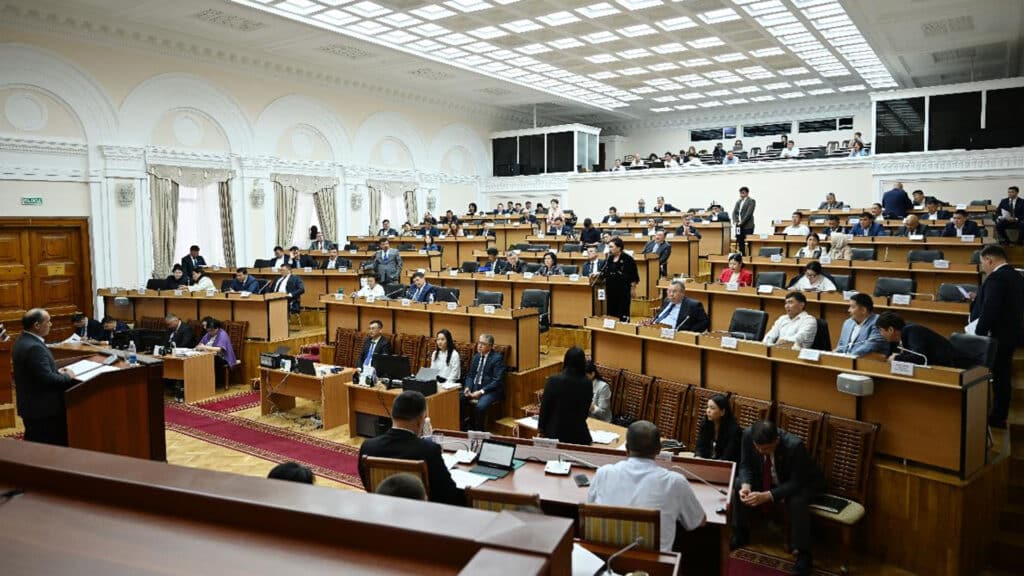Kyrgyzstan’s language divide: New law sparks fears of protests and discontent

A contentious draft language law passed its first reading in Kyrgyzstan’s parliament, the Jogorku Kenesh, sparking heated debate over national identity, interethnic relations and civil rights. The proposed law would require candidates for public office and civil service jobs to demonstrate proficiency in the Kyrgyz language. It also outlines language standards for school exams, advertising and media content. The specific proficiency levels would be defined later by the government.
While proponents argue that the legislation will strengthen the status of the Kyrgyz language, critics warn that it could marginalize non-Kyrgyz ethnic groups and incite unrest.
«Citizens living and working in Kyrgyzstan should speak the state language,» said Parliamentary Speaker Nurlanbek Turgunbek uulu, endorsing the draft law.
Supporters of the new legislation, including MP Nadira Narmatova, believe that it would motivate more people to learn Kyrgyz.
«If we do not create a demand for the language, nothing will change,» she said, as reported by the 24.kg news portal. «Spending money and asking people to learn the language is humiliating. Knowledge of the state language is a sign of respect for the Kyrgyz people and the country. This has nothing to do with division.»
MP Elmurza Satybaldiev also backed the draft law but criticized the requirement for parliamentary candidates to speak Kyrgyz, arguing that voters should be free to elect any representative, regardless of language. Even if the candidate only speaks English, that should be the people’s decision, he remarked.
However, strong opposition came from MP Balbak Tulobaev, who warned that the law could inflame ethnic tensions and trigger protests.
«You’ve destroyed a good initiative,» he said. «How can representatives of other nationalities become MPs now? Are they not part of the people? The constitution says the foundation of the state is the people. The Kyrgyz are the people, but what about other ethnicities? Are they not also part of the people of Kyrgyzstan?»
Another elected representative, MP Gulya Kojokulova, raised concerns that the proposed language law may contradict Kyrgyzstan’s constitution. She noted that if the regulation is approved, the National Commission on the State Language would be authorized to impose fines — 5,000 soms (about $57) on individuals and 17,000 soms (about $195) on legal entities. In her view, this would transform the commission, which is meant to promote language, into a punitive body.
According to the Kaktus.kg news outlet, MP Zhanybek Kydykbaev argued that the language issue is not severe enough to justify legal restrictions. He criticized using Bishkek, where Kyrgyz is less commonly spoken, as the standard for policymaking, emphasizing that conditions in the regions are significantly different.
«In independent Kyrgyzstan, it’s shameful to turn language development into a problem,» Kydykbaev said. «Even during Soviet times, we spoke Kyrgyz. We shouldn’t write laws using Bishkek as a benchmark. Go to the regions — everyone speaks Kyrgyz there, and that’s not going to change.»
Responding to Kydykbaev, fellow MP Kunduzbek Sulaimanov emphasized that the new law does not restrict the use of Russian, the country’s official language. He clarified that the proposed regulation simply mandates knowledge of Kyrgyz in addition to Russian for parliamentary candidates and public servants.
Despite ongoing disagreements, the draft law passed its first reading in parliament.
Under the constitution, Kyrgyzstan is officially a bilingual country. Kyrgyz is the state language, while Russian holds official status and is widely used in government, media and education.
In a separate cultural development, Kursiv.media previously reported that Kyrgyzstan failed to select a new national anthem from hundreds of submissions and has launched a new round of the contest.

